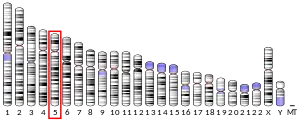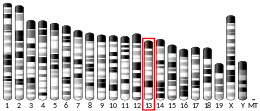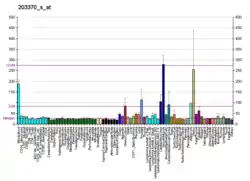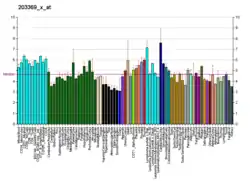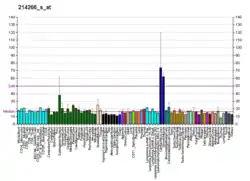PDLIM7
PDZ and LIM domain protein 7 is a protein that in humans is encoded by the PDLIM7 gene.[5][6]
The protein encoded by this gene is representative of a family of proteins composed of conserved PDZ and LIM domains. LIM domains are proposed to function in protein–protein recognition in a variety of contexts including gene transcription and development and in cytoskeletal interaction. The LIM domains of this protein bind to protein kinases, whereas the PDZ domain binds to actin filaments. The gene product is involved in the assembly of an actin filament-associated complex essential for transmission of ret/ptc2 mitogenic signaling. The biological function is likely to be that of an adapter, with the PDZ domain localizing the LIM-binding proteins to actin filaments of both skeletal muscle and nonmuscle tissues. Alternative splicing of this gene results in multiple transcript variants.[6]
References
- GRCh38: Ensembl release 89: ENSG00000196923 - Ensembl, May 2017
- GRCm38: Ensembl release 89: ENSMUSG00000021493 - Ensembl, May 2017
- "Human PubMed Reference:". National Center for Biotechnology Information, U.S. National Library of Medicine.
- "Mouse PubMed Reference:". National Center for Biotechnology Information, U.S. National Library of Medicine.
- Liu Y, Hair GA, Boden SD, Viggeswarapu M, Titus L (March 2002). "Overexpressed LIM mineralization proteins do not require LIM domains to induce bone". Journal of Bone and Mineral Research. 17 (3): 406–14. doi:10.1359/jbmr.2002.17.3.406. PMID 11874232. S2CID 26089809.
- "Entrez Gene: PDLIM7 PDZ and LIM domain 7 (enigma)".
- Guy PM, Kenny DA, Gill GN (June 1999). "The PDZ domain of the LIM protein enigma binds to beta-tropomyosin". Molecular Biology of the Cell. 10 (6): 1973–84. doi:10.1091/mbc.10.6.1973. PMC 25398. PMID 10359609.
Further reading
- Bach I (March 2000). "The LIM domain: regulation by association". Mechanisms of Development. 91 (1–2): 5–17. doi:10.1016/S0925-4773(99)00314-7. PMID 10704826. S2CID 16093470.
- Wu RY, Gill GN (October 1994). "LIM domain recognition of a tyrosine-containing tight turn". The Journal of Biological Chemistry. 269 (40): 25085–90. PMID 7929196.
- Kuroda S, Tokunaga C, Kiyohara Y, Higuchi O, Konishi H, Mizuno K, et al. (December 1996). "Protein-protein interaction of zinc finger LIM domains with protein kinase C". The Journal of Biological Chemistry. 271 (49): 31029–32. doi:10.1074/jbc.271.49.31029. PMID 8940095.
- Durick K, Gill GN, Taylor SS (April 1998). "Shc and Enigma are both required for mitogenic signaling by Ret/ptc2". Molecular and Cellular Biology. 18 (4): 2298–308. doi:10.1128/mcb.18.4.2298. PMC 121481. PMID 9528800.
- Guy PM, Kenny DA, Gill GN (June 1999). "The PDZ domain of the LIM protein enigma binds to beta-tropomyosin". Molecular Biology of the Cell. 10 (6): 1973–84. doi:10.1091/mbc.10.6.1973. PMC 25398. PMID 10359609.
- Borrello MG, Mercalli E, Perego C, Degl'Innocenti D, Ghizzoni S, Arighi E, et al. (August 2002). "Differential interaction of Enigma protein with the two RET isoforms". Biochemical and Biophysical Research Communications. 296 (3): 515–22. doi:10.1016/S0006-291X(02)00886-0. PMID 12176011.
- Andersen JS, Lam YW, Leung AK, Ong SE, Lyon CE, Lamond AI, Mann M (January 2005). "Nucleolar proteome dynamics". Nature. 433 (7021): 77–83. Bibcode:2005Natur.433...77A. doi:10.1038/nature03207. PMID 15635413. S2CID 4344740.
- Rual JF, Venkatesan K, Hao T, Hirozane-Kishikawa T, Dricot A, Li N, et al. (October 2005). "Towards a proteome-scale map of the human protein-protein interaction network". Nature. 437 (7062): 1173–8. Bibcode:2005Natur.437.1173R. doi:10.1038/nature04209. PMID 16189514. S2CID 4427026.
- Sangadala S, Boden SD, Viggeswarapu M, Liu Y, Titus L (June 2006). "LIM mineralization protein-1 potentiates bone morphogenetic protein responsiveness via a novel interaction with Smurf1 resulting in decreased ubiquitination of Smads". The Journal of Biological Chemistry. 281 (25): 17212–9. doi:10.1074/jbc.M511013200. PMID 16611643.
- Lim J, Hao T, Shaw C, Patel AJ, Szabó G, Rual JF, et al. (May 2006). "A protein-protein interaction network for human inherited ataxias and disorders of Purkinje cell degeneration". Cell. 125 (4): 801–14. doi:10.1016/j.cell.2006.03.032. PMID 16713569. S2CID 13709685.
- Barrès R, Grémeaux T, Gual P, Gonzalez T, Gugenheim J, Tran A, et al. (November 2006). "Enigma interacts with adaptor protein with PH and SH2 domains to control insulin-induced actin cytoskeleton remodeling and glucose transporter 4 translocation". Molecular Endocrinology. 20 (11): 2864–75. doi:10.1210/me.2005-0455. PMC 1892539. PMID 16803868.
